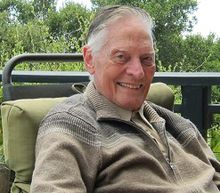Geoffrey Chew
Geoffrey Foucar Chew (born June 5, 1924 in Washington, D.C.; † April 11, 2019) was a U.S. theoretical physicist.
Chew studied at George Washington University (Bachelor 1944) and from 1944 under Enrico Fermi at the University of Chicago, where he received his doctorate in 1948 under Fermi (The elastic scattering of high energy nucleons by deuterons). From 1948 he was at the University of California, Berkeley, in the Radiation Laboratory and from 1949 as Assistant Professor of Physics. From 1950 to 1956 he was at the University of Illinois at Urbana-Champaign (as professor from 1955). In 1956 he was at the Institute for Advanced Study. From 1957 he was Professor of Physics at Berkeley. From 1993 he was Professor Emeritus there. From 1986 to 1993 he was Dean of the Physics Faculty there and from 1974 to 1978 Chairman of the Physics Faculty. He was Visiting Professor at Cambridge University as a Fellow of Churchill College in 1962/63, Visiting Professor at Princeton University in 1970/71, and at the University of Paris in 1983/84.
At Berkeley, he built an influential school of theoretical particle physicists in the 1960s who sought to understand the strong interaction via the theory of the S-matrix. After discovering with Steven Frautschi in 1960 that mesons could be divided into families in which spin was proportional to the square of mass, he interpreted this to mean that none of the then-known particles of the strong interaction were fundamental. Instead, he sought a description via analytic properties of the scattering matrix without resorting to a quantum field theory in local space-time formulation (bootstrap theory). His approach also became known as "nuclear democracy", since none of the "bound states" were considered elementary. In the 1970s, S-matrix theory was replaced by a "conservative" ordinary point-particle quantum field theory in the description of the strong interaction, quantum chromodynamics with associated quark model. At the same time, however, string theory, an attempt at a fundamental description of all interactions of elementary particles, developed from S-matrix theory from about 1970.
He was a member of the National Academy of Sciences (since 1962) and the American Academy of Arts and Sciences (since 1966). In 1962 he received the Hughes Prize of the American Physical Society and in 1969 the Ernest Orlando Lawrence Prize.
His doctoral students included the string theorists David Gross (1966) and John Schwarz (1966).

Geoffrey Chew 2014
Writings
- The analytic S-Matrix, Benjamin 1965
- Particles as S-Matrix Poles: Hadron democracy, in Hoddeson, Dresden, Brown (eds.) Pions to quarks: Particle physics in the 1950s, Cambridge University Press 1997.
Search within the encyclopedia